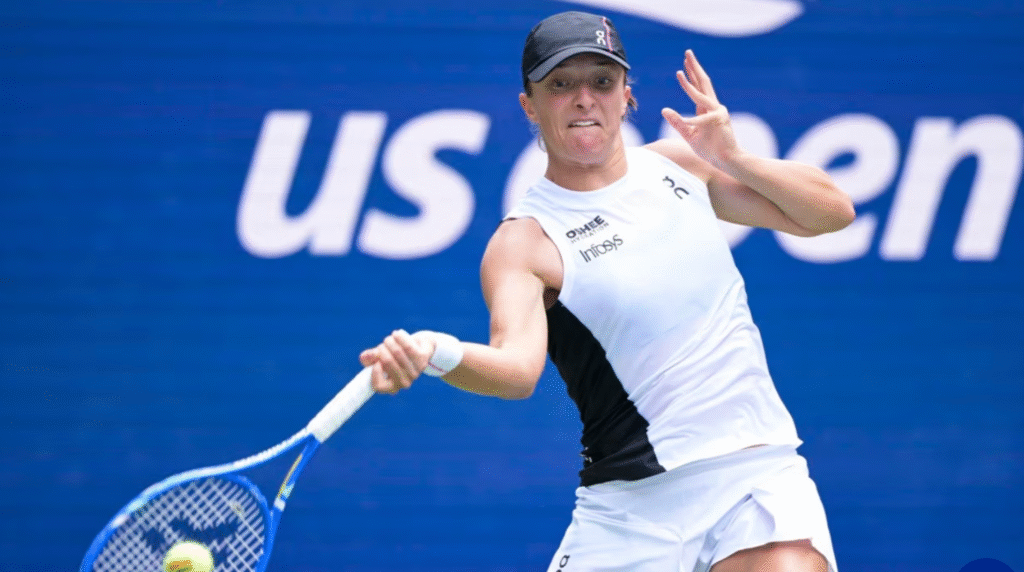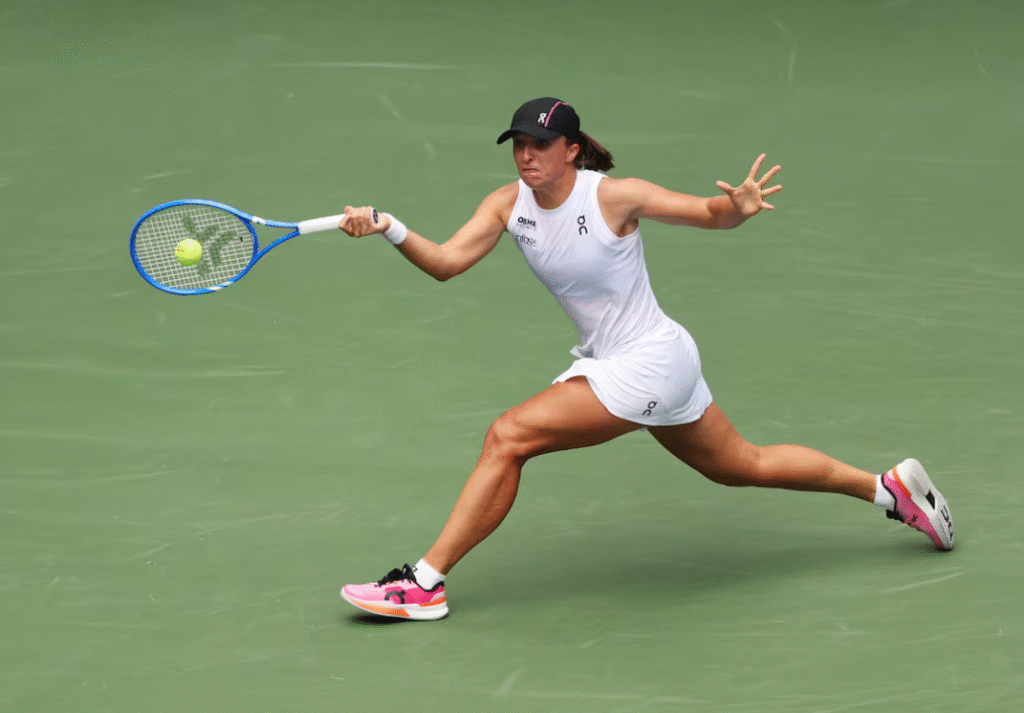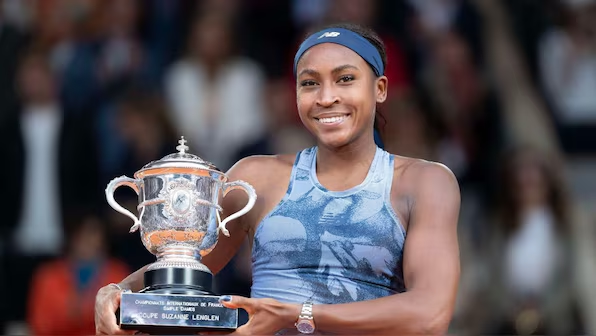
Ayobami Emmanuel | September 2, 2025
In the electric atmosphere of Arthur Ashe Stadium, world No. 2 Iga Swiatek delivered a masterclass of composure, precision, and tactical execution as she defeated Ekaterina Alexandrova 6–3, 6–1 to advance to the quarterfinals of the 2025 US Open. The victory not only underlined Swiatek’s consistency at the highest level but also cemented her reputation as one of the most adaptable and mentally resilient players in modern tennis.
With this win, Swiatek has now reached the quarterfinals in all four Grand Slams this season—a rare achievement that places her in elite company. At just 24 years old, she became the youngest woman since Maria Sharapova in 2005 to reach this milestone. More importantly, her performance in New York is a bold statement of intent: Swiatek is not just playing for wins, she is building a legacy.
The Match: A Lesson in Control
The contest began with both players trading powerful groundstrokes, each probing for early dominance. Alexandrova, seeded No. 13, attempted to impose her aggressive baseline game, striking hard and flat to push Swiatek behind the baseline. For the first six games, the match was tightly poised, with both players showcasing excellent serving and shot-making.
However, at 3–3 in the opening set, Swiatek turned the tide. With her trademark defensive anticipation and lightning-quick footwork, she broke Alexandrova’s serve in the seventh game after a prolonged rally that ended with an unforced error from the Russian. From that point, momentum swung heavily in her favor.
Swiatek closed out the first set 6–3, her composure and shot selection proving too much for Alexandrova’s more erratic play. The second set was a showcase of pure dominance: Swiatek raced to a 5–0 lead with relentless precision, dictating play with deep, angled forehands and sharp backhands down the line. Alexandrova managed to hold serve once, but the reprieve was short-lived as Swiatek sealed the match 6–1 with an ace down the T.

The statistics told the story: Swiatek won 78% of her first-serve points, converted four of her five break points, and committed only 12 unforced errors compared to Alexandrova’s 28. It was a performance of ruthless efficiency.
Swiatek’s Mental Edge
Beyond her technical superiority, what stood out most was Swiatek’s mental game. After the match, she admitted that Alexandrova’s aggressive start forced her to dig deeper and find her rhythm:
“At the beginning, I felt like she was playing fast… I wanted to find my rhythm, but later I really felt like I was in my bubble and in my zone. Intensity and focus—that’s what made the difference.”
Her ability to stay calm under pressure has become a hallmark of her career. Unlike many young players who struggle to handle the weight of expectation, Swiatek seems to thrive on it. In fact, during her post-match interview, she casually texted her coach asking for ten extra minutes of practice later in the day—a small but telling example of her relentless drive for improvement.
That moment, broadcast live on ESPN, quickly went viral on social media. Fans and commentators alike praised her professionalism, with many pointing out that such attention to detail is what separates champions from contenders.
A Historic Season
Swiatek’s 2025 campaign has already been remarkable. She won the French Open for the fourth time in June, reached the Wimbledon final, and made the semifinals at the Australian Open earlier in the year. By advancing to the quarterfinals in New York, she has completed a rare Grand Slam consistency streak that has not been achieved in two decades.
This run also underscores her transformation into a true all-surface player. Once considered a clay-court specialist, Swiatek has now proven she can dominate on hard courts and grass as well. Reflecting on her growth, she said:
“Now I like all of them [surfaces]… I can play on every surface if I feel good in my game and in my head.”
Her adaptability is not just physical but also mental. She studies opponents meticulously, alters tactics mid-match, and shows an uncanny ability to raise her level at the right moments.
What’s Next: A Rematch with Anisimova
Swiatek’s quarterfinal opponent will be Amanda Anisimova, who defeated Beatriz Haddad Maia to set up a highly anticipated clash. Tennis fans will recall that Anisimova stunned Swiatek at Wimbledon earlier this year, winning their final in straight sets. That loss stung, and Swiatek openly admitted afterward that she needed to improve her approach to power hitters like Anisimova.
Now, just two months later, she has the chance to exact revenge on one of the sport’s brightest rising stars. The match promises to be one of the highlights of the tournament: a tactical battle between Swiatek’s all-court precision and Anisimova’s raw power.
The Bigger Picture
Swiatek’s dominance comes at a crucial moment for women’s tennis. With legends like Serena Williams retired and Naomi Osaka still regaining her form, the sport has been searching for a consistent figurehead. While Coco Gauff and Aryna Sabalenka are strong contenders, it is Swiatek who has shown the most complete package: consistency, titles, and mental fortitude.
Her rise also highlights the importance of sports psychology in modern tennis. Swiatek has openly credited her mental coach for helping her develop routines that allow her to stay grounded under pressure. These include pre-match visualization, breathing techniques, and even using classical music to calm nerves before big matches.
A Star with Staying Power
While success in tennis can be fleeting, Swiatek’s work ethic suggests longevity. Her commitment to continuous improvement is evident in the smallest details, from adjusting her diet to optimize energy levels to spending hours studying opponents’ game tapes.
Her humility is equally striking. Despite being one of the most successful players of her generation, she avoids boastful statements and instead focuses on the process. After her win over Alexandrova, she concluded her press conference with a simple, understated line:
“I’m happy with the quality. But the tournament isn’t over. I still have a lot to do.”
Iga Swiatek’s straight-sets dismissal of Ekaterina Alexandrova was more than just another win—it was a statement of her evolution into the dominant force of women’s tennis. Her ability to stay composed, adapt mid-match, and execute her game plan with precision reflects a maturity beyond her years.
With history on her side and a potential rematch with Amanda Anisimova looming, the US Open 2025 has become a proving ground for Swiatek’s quest not just to win titles, but to define an era.
Whether she lifts the trophy in New York or not, one thing is certain: Iga Swiatek has already cemented her place among the greats of her generation.


